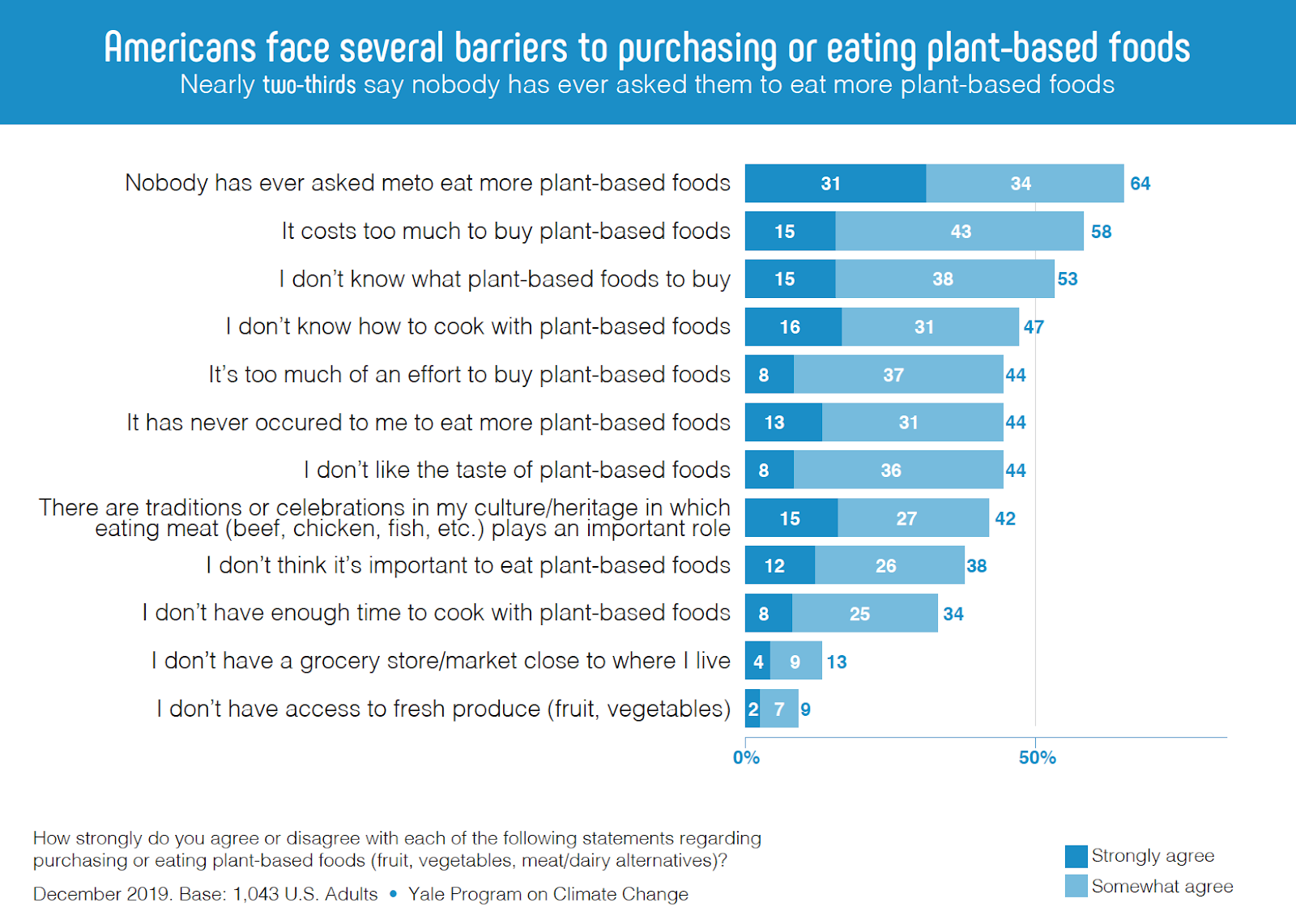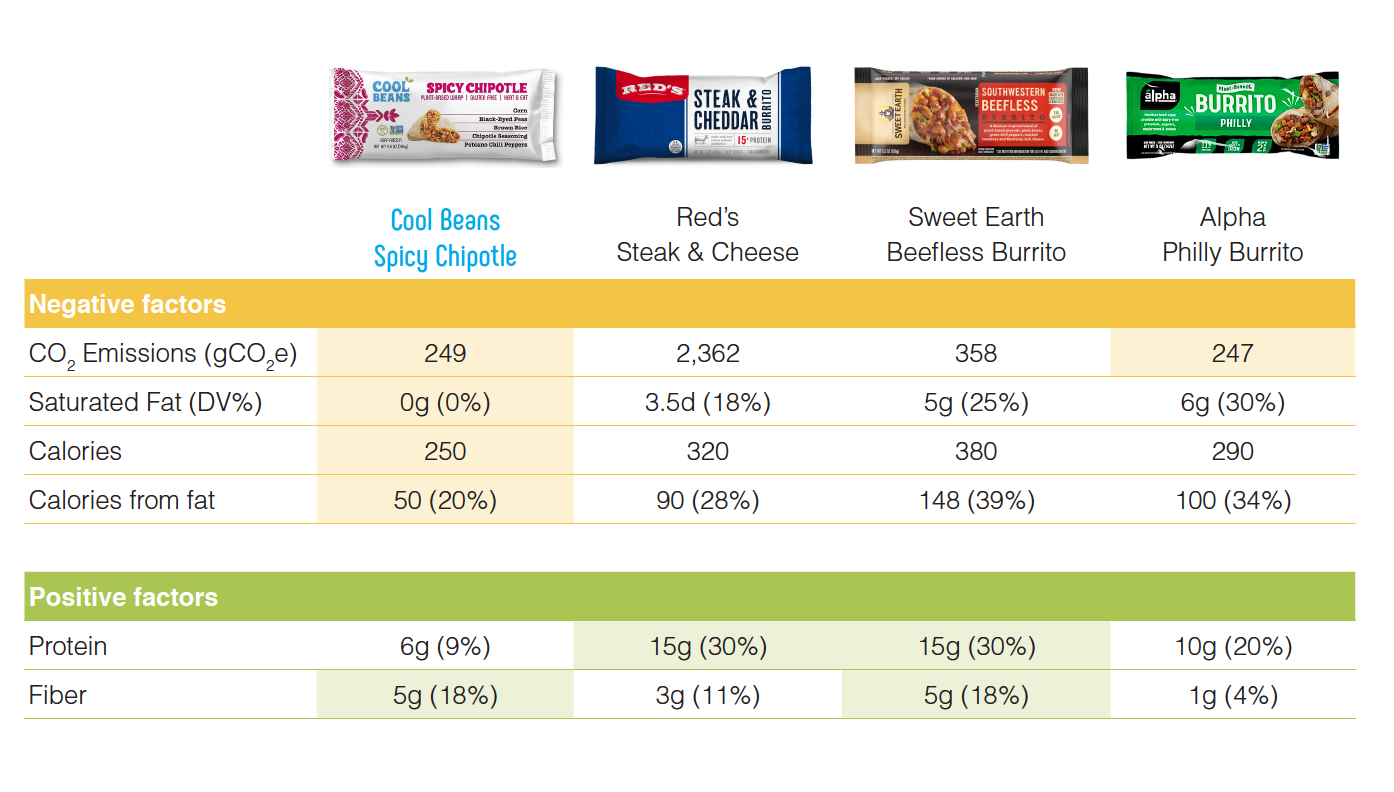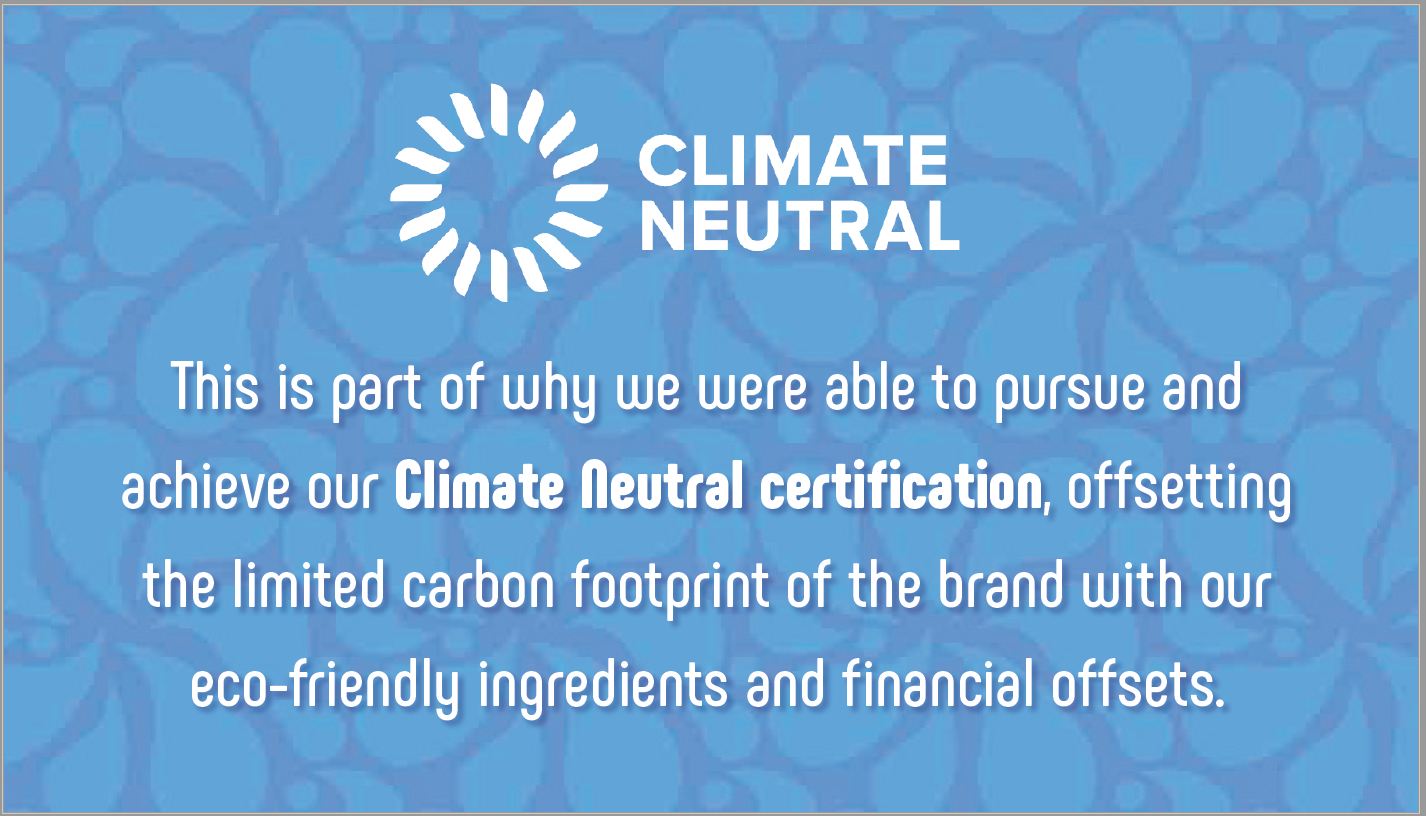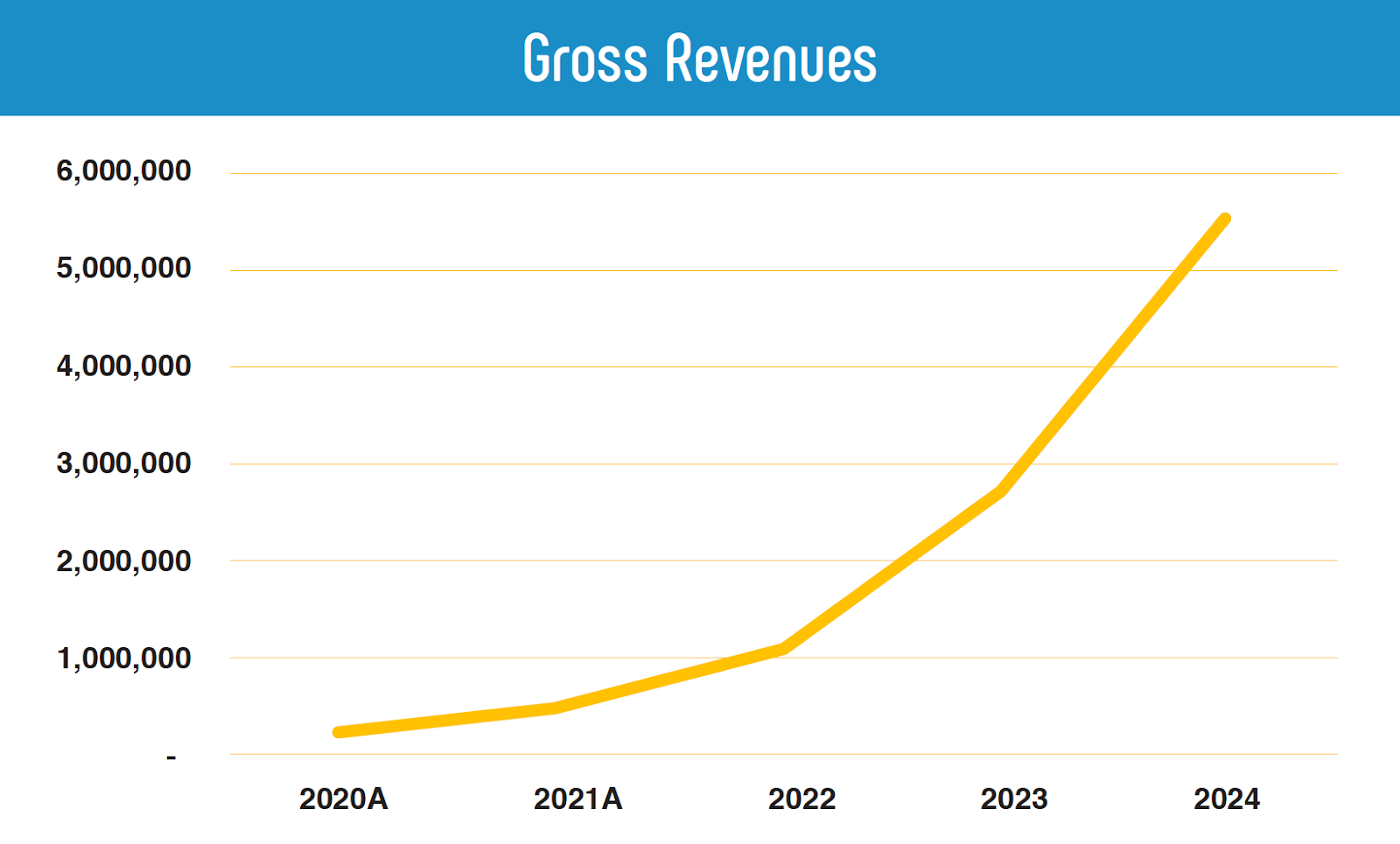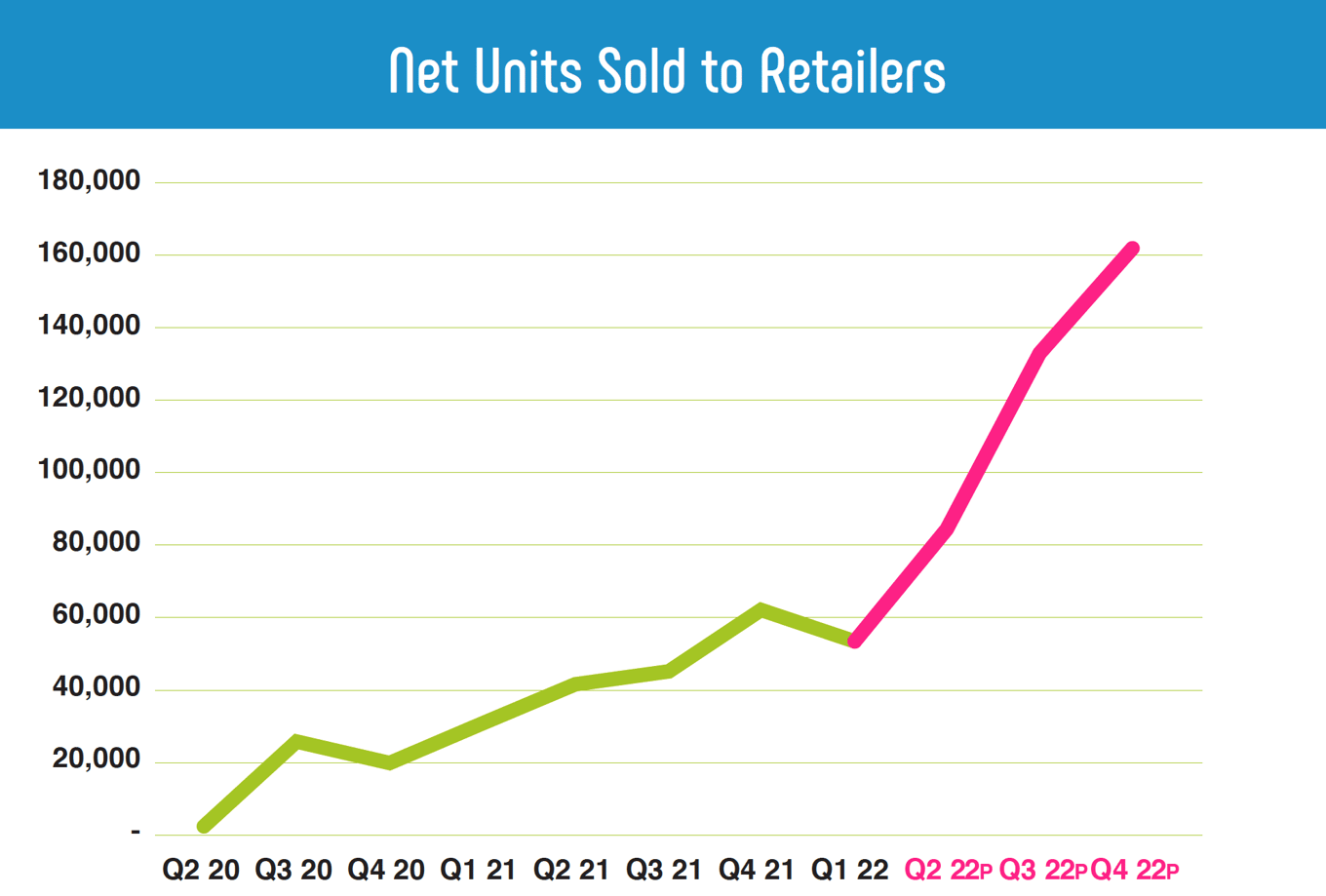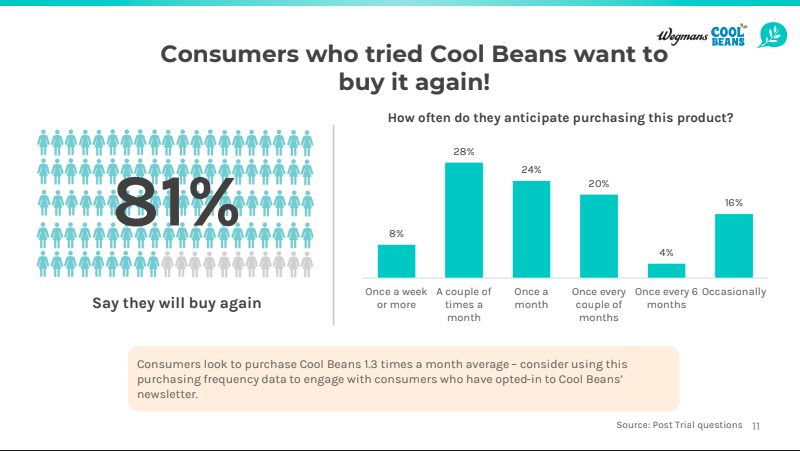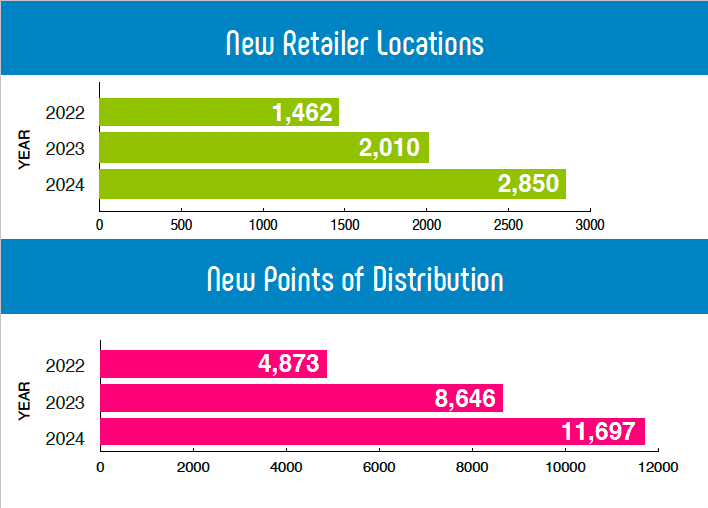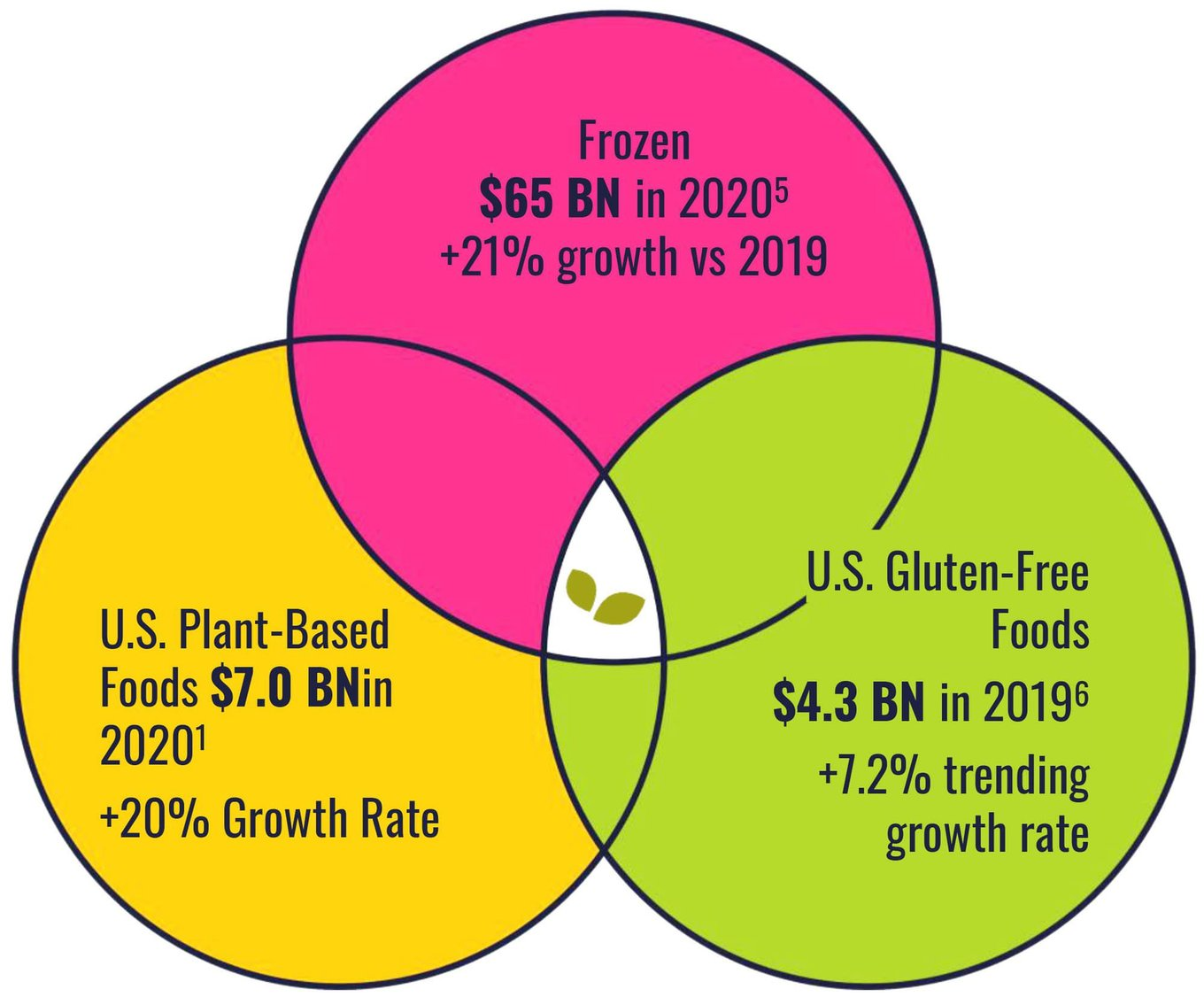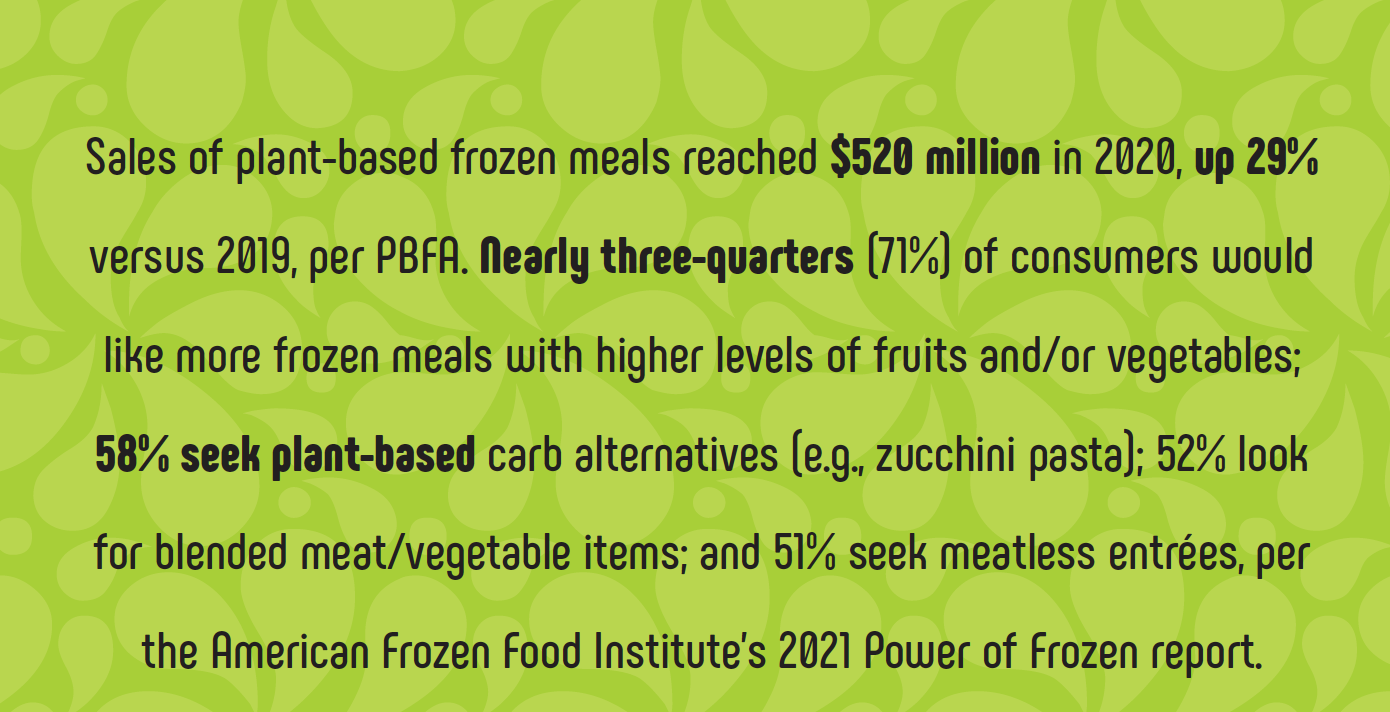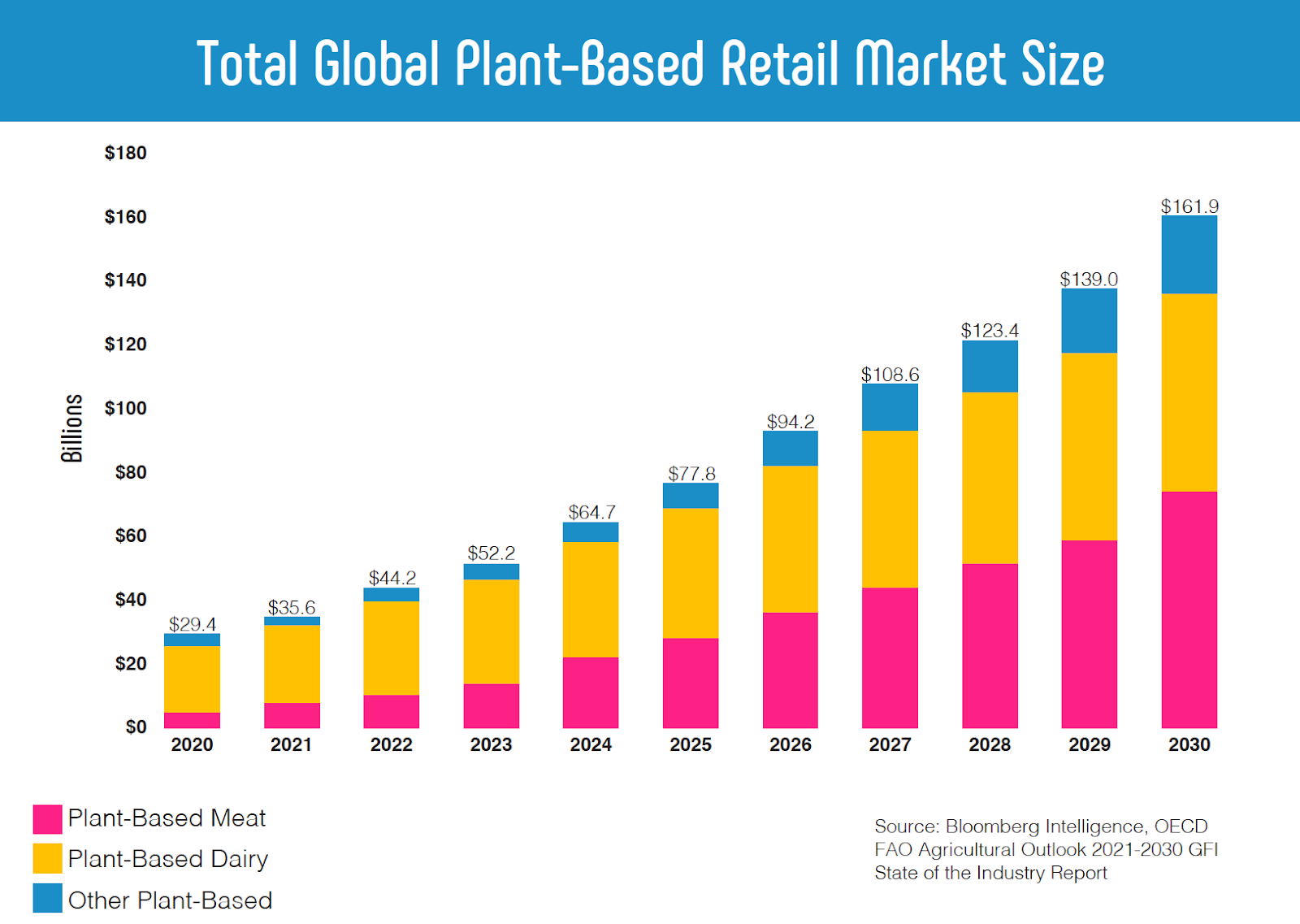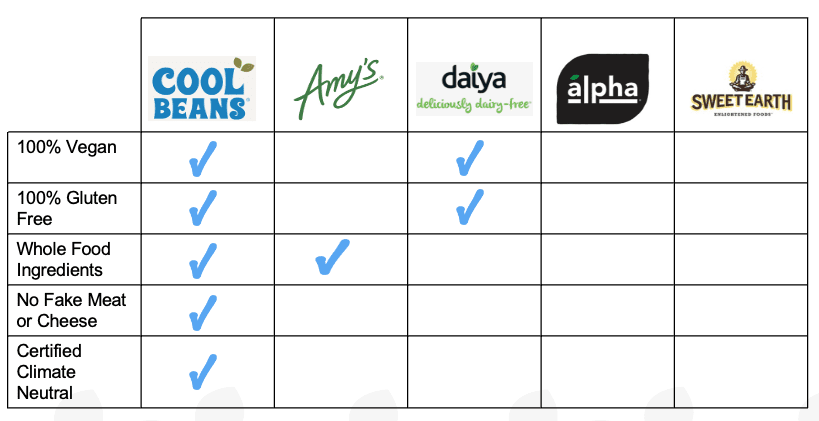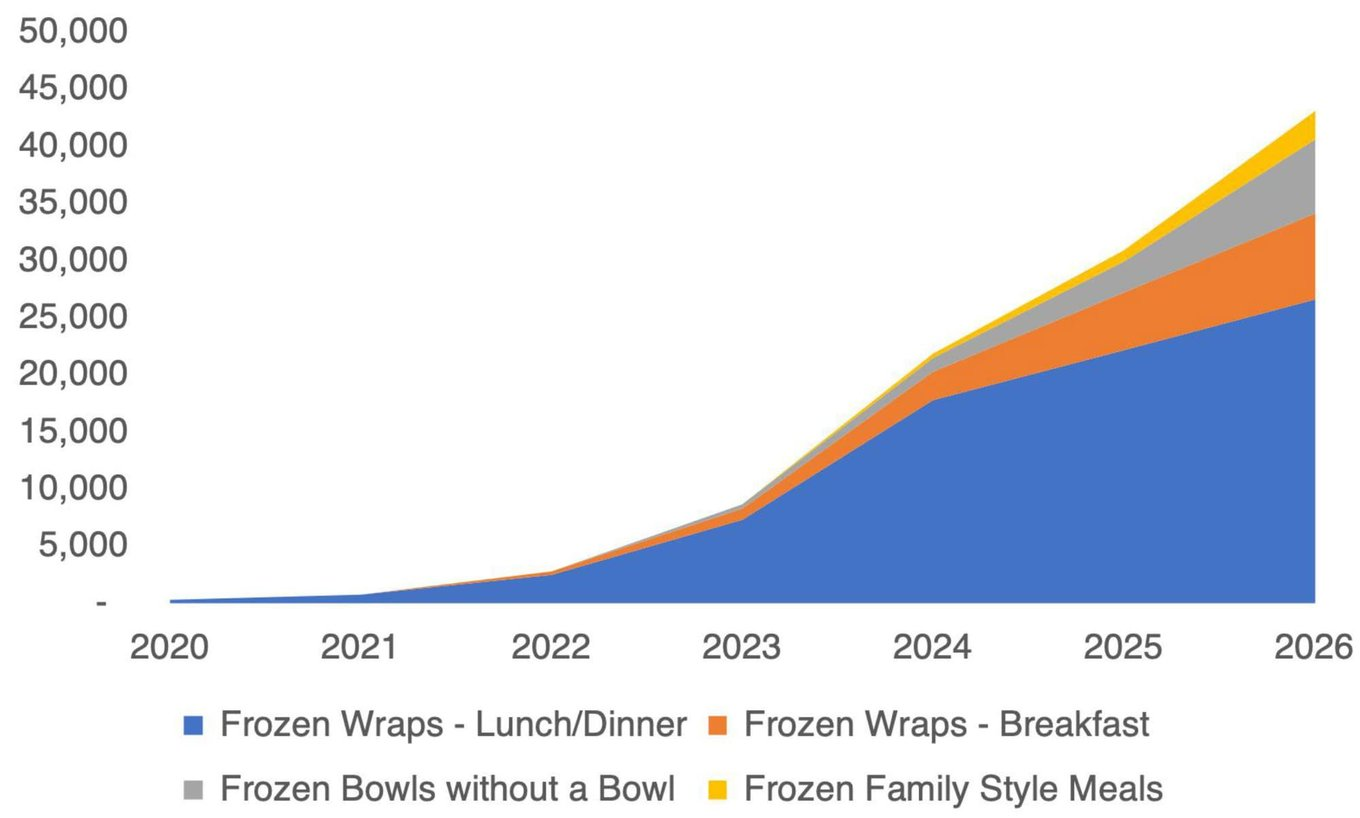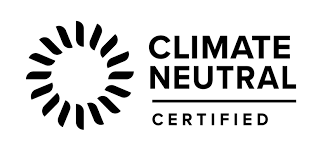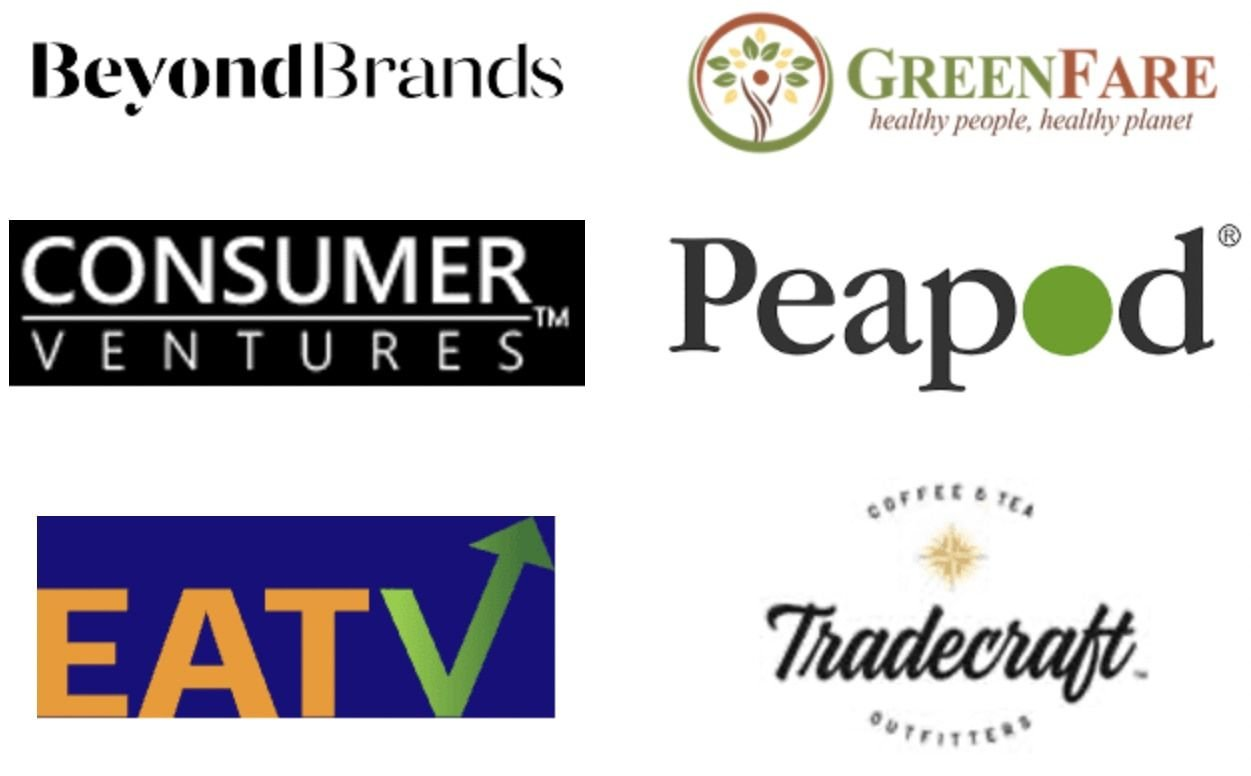Cool Beans
Plant-based goodness from whole food ingredients—great for people & the planet

Summary edit edit source
- Pairs HERO BEAN & WHOLE FOOD ingredients = Tasty & Convenient!
- Launched in 2020, $412k in first 2 years, $1.2M projected run rate in 2022*
- Available at 5,000+ PODs,1,500+ stores, Sprouts, Whole Foods NE, Wegman's
- 16 distribution centers with Kehe and UNFI
- #2 Alternative Frozen Hand-Held at leading natural foods retailer
- 81% of natural food consumers would recommend to their friends
- Appeal to vegans & flexitarians with REAL FOOD from nature, not a lab
Problem edit edit source
Why is it so HARD to eat WELL? edit edit source
Oh, well, that’s an interesting and complex question. People are adopting plant-forward diets for many reasons—health, environmental, and animal welfare. But eating plant-based is still seen as complicated and difficult, and many perceive it to be costly and inconvenient.
Not all plant-based frozen products are clean and healthier edit edit source
University students rely on meal plans and school cafeterias for food, but for many, finding sustainable or plant-based options can prove difficult. The major university provider, Sodexo, is restructuring their menus across the United States by increasing plant-based meal offerings by 42 percent by 2025. This GFI White Paper from 2020 identifies convenience as a key limiting factor in the adoption of plant-based meats, and recommends that the plant-based meat world builds more products that make it similar to eating real meat. But our question is why? Why not bring real plants to the forefront?
We get it. Finding nutrition in a plant-based diet takes time and effort. The founding team at Cool Beans—on this whole food, plant-based journey ourselves—eyed “convenient” options. We realized that so much of what had made its way into stores is a whole lotta processed food.
Solution edit edit source
Plant-based should be.... from PLANTS. And, eating well should be easy. edit edit source
So what’s a Cool cat to do? We looked to the plant world—not just plant-based, but actual plants—to see how we could create a fast, convenient way to bring more whole food ingredients into our diets, without processing them to death. And we found our hero in the humble bean. What’s more, we committed ourselves to creating foods with chefs, not in a lab—featuring recognizable, whole-food ingredients.
Cool Beans is REAL food. Whole food, minimally processed, plant-based—and amazing taste and texture. edit edit source

Cool Beans launched in 2020 with its first products, a line of frozen, minimally processed, plant-based wraps that are ready in minutes and make it much easier to bring whole foods into the diet…without all the work of cooking them from scratch. The wraps are a vegan taste adventure, featuring unique flavors inspired by global cuisines, adding in additional plants for a diversity of ingredients, and wrapping it all in a specially made gluten-free wrap for a quick, savory, simple meal.
Product edit edit source
Beans, beans, the magical fruit. No, really, they’re magical. We swear.
An ancient superfood, the bean genus is unique in its vegetable-meets-protein being. Beans pack a powerful punch in the complex carbohydrates, fiber, and protein it provides to each and every bite, with sustaining energy that makes them a perfect starting point for a meal.
What's most incredible about beans? They give back to the soil in which they’re grown. Legume roots have a unique ability to produce nitrogen, a significant nutrient in fertilizer, and deposit it back into the soil, so farmers don’t need as much carbon-intensive liquid nitrogen fertilizer. Pretty cool, huh?
What came next? Plant diversity. We loaded up each Cool Beans wrap with 27 plant-based ingredients, delivering appealing flavor, gut health, and supporting diverse agriculture along the way.
Our Wrap edit edit source
As we continue to bring light to the powerful bean in the next set of products—bowls, family meals, and sides—we will remain true to these principles, and will consistently test to ensure we’re staying ahead of consumer interests and demands.
Traction edit edit source
Early successes: Sales, Distribution, Velocity & TDP Growth edit edit source
Cool Beans has taken a cadenced approach to sales, starting first in the natural and specialty channels and now growing in mainstream grocery. In the first two years, the brand achieved $412,000 in gross revenue and is poised to increase yearly revenues by 45%* following the elimination of our distributor, leading to a projected $1.2M run rate at end of 2022.* We have more than 5000 total distribution points in 1500 retail doors, including Sprouts, Wegman’s, Safeway (Nor CA) Whole Foods (Northeast), PCC, Huckleberrys, Dierberg’s, Goodeggs, Market of Choice, Fairway, Nugget, Bristol Farms, and many others.
Cool Beans comes in at a hot 2.5 units/store/week by SKU/Item, with limited marketing and sales support. High-velocity doors turn more than 6 units/store/week.
Customers edit edit source
Consumer reviews: 83% would recommend! edit edit source
Consumer data explains the performance. In a panel of several thousand natural products consumers who tried Cool Beans, more than 83% would recommend them to a friend and 81% would purchase them again.
Business model edit edit source
Target product margin: 47-52% edit edit source
While our product and ingredients give back to the environment, we don’t fancy ourselves a charity, and the business model was set up for success from the get-go. As investors themselves, the leadership team at Cool Beans sought to create a product that had a solid, investible gross margin from the start, and built a lean team of pros to get through the proof of concept phase.
Use of the investment edit edit source
Continue to build our Cool Beans brand through digital marketing, social media, and consumer engagement.
Phase 2 of new product development, expanding our family of products. Expected market launch in 2023.
Enhance our sustainability promise with alternative packaging and ingredient sourcing.
Market edit edit source
At the intersection of 3 fast-growing market segments edit edit source
It's not a fad: plant-based eating, frozen and gluten free are on a long-term growth trajectory. Cool Beans is in the SWEET spot of all three. Sprinkle in global tasty flavors and convenient means Cool Beans is unstoppable.
Plant-based eating—and particularly whole foods within that—continues to grow, fueled by medical industry research as well as influencer and celebrity support.
Let’s start small here. The handheld wrap category is over $2.9 billion in size and grew 11% in 2021 fueled most recently by the pandemic and a continuing desire to prep easy healthier, plant based food for oneself and their family. Seems simple, but the handheld market is a massive culprit in the vegan junk food trend
According to Bloomberg Intelligence, expansion of retail distribution points, growing consumer interest, and consistent supply chain will differentiate growth as a long term trend vs. a fad.
Competition edit edit source
Uniquely positioned in the handheld category: Whole Food, Minimally Processed, Carbon Neutral edit edit source
Vision and strategy edit edit source
Our vision is to make eating plant-based easier, healthier, and more accessible to all edit edit source
Adding a new family of whole food, minimally processed line in 2022 en route to creating a family
Cool Beans isn't just a catchphrase anymore. We are whole food, plant-based, minimally processed ingredients, and delicious globally-inspired flavors, all wrapped up in a gluten-free wrap for your taste enjoyment.
Product pipeline, revenue potential*
Added in 2021
Innovation for 2023
Impact edit edit source
Our sustainability pledge edit edit source
Good for you, Good for the environment
At Cool Beans we believe whole food, plant-based nutrition is key to improving the health of your body and the environment (and saving a ton of animals, too!). And our vision is to make eating plant-based easier, healthier, and more accessible to all.
Like most things, our products do still create a carbon footprint, so it is with great pride that we share that we have become a Climate Neutral certified company, offsetting our small carbon footprint. Those offsets are used to fund several green projects, including reforestation projects in South America and solar projects in China. Our offsets for just 2020 alone, our first year in existence, are equivalent to planting 507 acres of forests.
Minimizing our impact on Planet Earth is wired into our DNA at Cool Beans. That scary underbelly, you ask? 16% to 19% of all greenhouse gases in the US are caused by animal agriculture—more than all the cars and trucks on the road! It is not just the animals, but all the inputs needed to raise those animals including using 65% of our farmland to grow their feed and the carbon-intensive fertilizers needed to grow those crops.
edit edit source
100% plant-based edit edit source
Because we wanted to be part of the climate solution and not part of the problem, all of our products would be 100% vegan.
Built around the mighty bean edit edit source
Legumes are both an incredible superfood and eco-warriors, pulling carbon out of the air and sequestering it into the soil. As one of the few plants that put nitrogen into the soil, they are key for healthy crop rotation and healthy soil.
Diversity of plants edit edit source
The Earth’s biodiversity is key to human survival on the planet. Plant diversity incentivizes farmers to grow a variety of plants and is a key tenet behind regenerative agriculture; each plant puts different nutrients into the soil for other plants. Our first five Cool Beans wraps contain 27 different plants.
We're proud of the products we have created, and they leave a much lower carbon footprint than similar animal-product wraps. Using the carbon footprint calculator at Myemissions.org, we calculate that our Spicy Chipotle burrito creates 92% less greenhouse gases than the leading steak and cheese burrito!
We are committed to sustainability edit edit source
We continue to search for compostable or biodegradable packaging, and are eager for that technology to be readily available in the frozen aisle. We're on high alert, seeking other ways to positively benefit the climate, biodiversity, and waste to help restore our planet for a sustainable and healthy future.
Funding edit edit source
Backed by angel investors including Co-Founders of the following companies: edit edit source
Founders edit edit source
Tyler Mayoras | Co-Founder & Co-CEO Tyler has over 20 years of private equity investing experience including the Co-Manager of the $155 million Advantage Capital Food & Ag Fund. The Fund focuses on investing in growth companies in sustainable agriculture and better for your food. During his career in private equity he has been involved with several high growth companies including Boca Burger (before it was sold to Kraft), Simple Mills and Farmhouse Culture. He sits on the Board of a number of companies including Shenandoah Growers, Farmhouse Culture and Snaxsational Brands. Tyler is also a Board Member of Naturally Chicago and ACG Chicago. Brand Experience: Boca Burger, Simple Mills, Farmhouse Culture, SnackPop, Tiesta Tea, Lavva
Mike Brennan | Co- Founder & Co- CEO Mike Brennan | Co- Founder & Co- CEO As a co-founder at Cool Beans he is working with the team to intelligently scale the business Mike is also an advisor/investor for early-stage companies normally in the $10 to $50 million in sales. He works at the intersection of food, technology and last mile He is currently on the board of three companies. And, is an adviser with companies like Farmers Fridge and Farmstead among others. Previously Mike was Senior Vice President and COO at Peapod. For 19 years growing the company from $7 million to nearly $1 billion in sales. He worked across Marketing, Merchandising, Customer Service and Transportation overseeing the consumer offering and go-to market strategy. Prior to joining Peapod, Mike was at the Management Consulting firm A.T. Kearney. He was a Principal focusing on business and marketing strategy. Prior to A.T. Kearney he worked at the Procter and Gamble Company. Mike is a graduate of the University of Illinois and the Kellogg Graduate School of Management at Northwestern. Brand Experience: Peapod, Farmers Fridge, Kiwicampus, Kitchfix, Chowly, and Vosges
Caryn Rowe Africk | Co-Founder & Sales and Marketing Leader Caryn is a multi-disciplined executive with leadership experience in business strategy, marketing, sales, digital transformation, and operations. Industry experience is broad- ecommerce, CPG product development, technology, professional services, and manufacturing; spanning multi-billion dollar to private equity early stage companies. Caryn has counseled corporate leaders and boards on growth strategies, strategic leverage of technology, and organizational assessments. Recent engagements included product development for high growth meal kit business, grocery ecommerce merchandising, and a new strategic plan for one of Chicago’s largest nonprofits. A yogi at heart feeds a balance and wisdom to find peace and gratitude each and every day. Brand Experience: Peapod, Seeds of Change, Barilla, Wildfire, Big Bowl, Hewitt Associates, YMCA of Metro Chicago. GCI
Eric Schnell | Co-Founder Eric has nearly 20 years of experience in sales, marketing and operations in the Natural Products industry, with diverse experience managing upstart companies and launching new brands and products. Eric is the co-founder of Steaz, which was strategically acquired in 2016, and co-founder of BeyondBrands and Good Catch. Eric is the recipient of the 2007 Sustainable Business of the Year Award, 4-time winner of the BevNET.com Best Product of the Year Award, and a Beverage World Magazine Top 50 Disruptor for 2016. Brand Experience: Steaz, Runa, Good Catch, I AM, Country Life.
Cool Beans Team edit edit source
Tyler Mayoras
Co-Founder and Co-CEO
Mike Brennan
Co-Founder and Co-CEO
Caryn Rowe Africk
Co-Founder and Marketing Leader
Eric Schnell
Co-Founder
Mark Doskow
General Manager
For 15 years, Mark has increased the reach of the plant-based foods movement with his team-first leadership approach. Mark's experience includes Candle Cafe, Matthew Kenney Cuisine, and Plant Food + Wine. Mark lives with his plant-based family in LA.
Risks edit edit source
We have a limited operating history upon which you can evaluate our performance, and accordingly, our prospects must be considered in light of the risks that any new company encounters.
The Company is still in an early phase and we are just beginning to implement our business plan. There can be no assurance that we will ever operate profitably. The likelihood of our success should be considered in light of the problems, expenses, difficulties, complications and delays usually encountered by early-stage companies. The Company may not be successful in attaining the objectives necessary for it to overcome these risks and uncertainties.
Global crises, such as COVID-19, can have a significant effect on our business operations and revenue projections.
A significant outbreak of contagious diseases, such as COVID-19, in the human population could result in a widespread health crisis that could adversely affect the economies and financial markets of many countries, including the United States where we principally operate, resulting in an economic downturn that could reduce the demand for our products and services and impair our business prospects, including as a result of being unable to raise additional capital on acceptable terms to us, if at all.
The amount of capital the Company is attempting to raise in this Offering may not be enough to sustain the Company’s current business plan.
In order to achieve the Company’s near and long-term goals, the Company may need to procure funds in addition to the amount raised in the Offering. There is no guarantee the Company will be able to raise such funds on acceptable terms or at all. If we are not able to raise sufficient capital in the future, we may not be able to execute our business plan, our continued operations will be in jeopardy and we may be forced to cease operations and sell or otherwise transfer all or substantially all of our remaining assets, which could cause an Investor to lose all or a portion of their investment.
We may face potential difficulties in obtaining capital.
We may have difficulty raising needed capital in the future as a result of, among other factors, our lack of revenues from sales, as well as the inherent business risks associated with our Company and present and future market conditions. Our business currently has limited sales and future sources of revenue may not be sufficient to meet our future capital requirements. We will require additional funds to execute our business strategy and conduct our operations. If adequate funds are unavailable, we may be required to delay, reduce the scope of or eliminate one or more of our research, development or commercialization programs, product launches or marketing efforts, any of which may materially harm our business, financial condition and results of operations.
We may not have enough authorized capital stock to issue shares of common stock to investors upon the conversion of any security convertible into shares of our common stock, including the Securities.
Currently, our authorized capital stock consists of 14,000,000 shares of common stock, of which 8,253,333 shares of common stock are issued and outstanding and the Company has 5,046,401 options to purchase common stock issued and outstanding (including 1,473,711 options that remain subject to the execution of definitive award agreements). Unless we increase our authorized capital stock, we may not have enough authorized common stock to be able to obtain funding by issuing shares of our common stock or securities convertible into shares of our common stock. We may also not have enough authorized capital stock to issue shares of common stock to investors upon the conversion of any security convertible into shares of our common stock, including the Securities.
We may implement new lines of business or offer new products and services within existing lines of business.
As an early-stage company, we may implement new lines of business at any time. There are substantial risks and uncertainties associated with these efforts, particularly in instances where the markets are not fully developed. In developing and marketing new lines of business and/or new products and services, we may invest significant time and resources. Initial timetables for the introduction and development of new lines of business and/or new products or services may not be achieved, and price and profitability targets may not prove feasible. We may not be successful in introducing new products and services in response to industry trends or developments in technology, or those new products may not achieve market acceptance. As a result, we could lose business, be forced to price products and services on less advantageous terms to retain or attract clients or be subject to cost increases. As a result, our business, financial condition or results of operations may be adversely affected.
We rely on other companies to provide components and services for our products.
We depend on suppliers and contractors to meet our contractual obligations to our customers and conduct our operations. Our ability to meet our obligations to our customers may be adversely affected if suppliers or contractors do not provide the agreed-upon supplies or perform the agreed-upon services in compliance with customer requirements and in a timely and cost-effective manner. Likewise, the quality of our products may be adversely impacted if companies to whom we delegate manufacture of major components or subsystems for our products, or from whom we acquire such items, do not provide components which meet required specifications and perform to our, and our customers’, expectations. Our suppliers may also be unable to quickly recover from natural disasters and other events beyond their control and may be subject to additional risks such as financial problems that limit their ability to conduct their operations. The risk of these adverse effects may be greater in circumstances where we rely on only one or two contractors or suppliers for a particular component. Our products may utilize custom components available from only one source. Continued availability of those components at acceptable prices, or at all, may be affected for any number of reasons, including if those suppliers decide to concentrate on the production of common components instead of components customized to meet our requirements. The supply of components for a new or existing product could be delayed or constrained, or a key manufacturing vendor could delay shipments of completed products to us adversely affecting our business and results of operations.
We face various risks as an e-commerce retailer.
As part of our growth strategy, we have made significant investments to grow our e-commerce business. We may require additional capital in the future to sustain or grow our e-commerce business. Business risks related to our e-commerce business include our inability to keep pace with rapid technological change, failure in our security procedures or operational controls, failure or inadequacy in our systems or labor resource levels to effectively process customer orders in a timely manner, government regulation and legal uncertainties with respect to e-commerce, and collection of sales or other taxes by one or more states or foreign jurisdictions. If any of these risks materialize, they could have an adverse effect on our business. In addition, we face competition, and may continue to face increased competition in the future, from internet retailers who enter the market. Our failure to positively differentiate our product and services offerings or customer experience from these internet retailers could have a material adverse effect on our business, financial condition and results of operations.
We rely on co-packers to provide our supply of products.
Any failure by co-packers to fulfill their obligations or any termination or renegotiation of our co-packing agreements could adversely affect our results of operations. We have supply agreements with co-packers that require them to provide us with specific finished products. We rely on co-packers as our sole-source for products. We also anticipate that we will rely on sole suppliers for future products. The failure for any reason of a co-packer to fulfill its obligations under the applicable agreements with us or the termination or renegotiation of any such co- packing agreement could result in disruptions to our supply of finished goods and have an adverse effect on our results of operations. Additionally, from time to time, a co-packer may experience financial difficulties, bankruptcy or other business disruptions, which could disrupt our supply of finished goods or require that we incur additional expense by providing financial accommodations to the co-packer or taking other steps to seek to minimize or avoid supply disruption, such as establishing a new co- packing arrangement with another provider. During an economic downturn, our co-packers may be more susceptible to experiencing such financial difficulties, bankruptcies or other business disruptions. A new co-packing arrangement may not be available on terms as favorable to us as the existing co- packing arrangement, if at all.
The inability of any supplier, co-packer, third-party distributor or transportation provider to deliver or perform for us in a timely or cost-effective manner could cause our operating costs to increase and our profit margins to decrease.
We must continuously monitor our inventory and product mix against forecasted demand or risk having inadequate supplies to meet consumer demand as well as having too much inventory on hand that may reach its expiration date and become unsaleable. If we are unable to manage our supply chain effectively and ensure that our products are available to meet consumer demand, our operating costs could increase and our profit margins could decrease. Failure by our transportation providers to deliver our products on time or at all could result in lost sales. We use third-party transportation providers for our product shipments. Transportation services include scheduling and coordinating transportation of finished products to our customers, shipment tracking and freight dispatch services. Our use of transportation services for shipments is subject to risks, including increases in fuel prices, which would increase our shipping costs, and employee strikes and inclement weather, which may impact the ability of providers to provide delivery services that adequately meet our shipping needs, including keeping our products adequately refrigerated during shipment. Any such change could cause us to incur costs and expend resources. Moreover, in the future we may not be able to obtain terms as favorable as those we receive from the third-party transportation providers that we currently use, which in turn would increase our costs and thereby adversely affect our business, financial condition and results of operations.
Product recalls and product liability, as well as changes in product labeling, safety and other consumer protection laws, may adversely impact our operations, merchandise offerings, reputation, financial condition, results of operations, and cash flows.
We are subject to regulations by a variety of federal, state, and international regulatory authorities, including regulations regarding the safety and quality of our products. We purchase merchandise from different vendors. One or more of our vendors might not adhere to product safety requirements or our quality control standards, and we might not identify the deficiency before merchandise ships to our customers. Any issues of product labeling or safety, or allegations that our products are in violation of governmental regulations, could cause those products to be recalled. If our vendors fail to manufacture or import merchandise that adheres to our quality control standards, product safety requirements, or applicable governmental regulations, our reputation and brands could be damaged, potentially leading to increases in customer litigation against us. Further, to the extent we are unable to replace any recalled products, we may have to reduce our merchandise offerings, resulting in a decrease in sales. If our vendors are unable or unwilling to recall products failing to meet our quality standards, we may be required to recall those products at a substantial cost to us. Moreover, changes in product safety or other consumer protection laws could lead to increased costs to us for certain merchandise, or additional labor costs associated with readying merchandise for sale.
Our inability to secure, maintain and increase our presence in retail stores could adversely impact our revenue, and in turn our business, financial condition, results of operations and prospects could be adversely affected.
Our operations include sales to retail stores and their related websites, which has accounted for a substantial portion of our revenue. The success of our business is largely dependent on our continuing development of strong relationships with such stores. The loss of our relationship with any large retail partner could have a significant impact on our revenue. In addition, we may be unable to secure adequate shelf space in new markets, or any shelf space at all, until we develop relationships with the retailers that operate in such markets. Consequently, growth opportunities through our retail channel may be limited and our revenue, business, financial condition, results of operations and prospects could be adversely affected if we are unable to successfully establish relationships with other retailers in new or current markets.
We also face severe competition to display our products on store shelves and obtain optimal presence on those shelves.
Due to the intense competition for limited shelf space in the food condiment category, retailers are in a position to negotiate favorable terms of sale, including price discounts, allowances and product return policies. To the extent we elect to increase discounts or allowances in an effort to secure shelf space, our operating results could be adversely affected. We may not be able to increase or sustain our volume of retail shelf space or offer retailers price discounts sufficient to overcome competition and, as a result, our sales and results of operations could be adversely affected. In addition, many of our competitors have significantly greater financial, manufacturing, marketing, management and other resources than we do and may have greater name recognition, a more established distribution network and a larger base of wholesale customers and distributors. Many of our competitors also have well-established relationships with our current and potential consumers who purchase such competitors’ other products at retail stores, and have extensive knowledge of our target markets. As a result, these competitors may be able to devote greater resources to the development, promotion and sale of their products and respond more quickly to evolving consumer preferences for us. If our competitors’ sales surpass ours, retailers may give higher priority to our competitors’ products, causing such retailers to reduce their efforts to sell our products and resulting in the loss of advantageous shelf space.
Increases in raw materials, packaging, oil and natural gas costs and volatility in the commodity markets may adversely affect our results of operations.
Our financial results depend to a large extent on the costs of raw materials, packaging, oil and natural gas, and our ability to pass the costs of these materials onto our customers. Historically, market prices for commodity grains and food stocks have fluctuated in response to a number of factors, including economic conditions such as inflation, changes in U.S. government farm support programs, changes in international agricultural trading policies, impacts of disease outbreaks on protein sources and the potential effect on supply and demand as well as weather conditions during the growing and harvesting seasons. Fluctuations in paper, steel and oil prices, which affect our costs for packaging materials, have resulted from changes in supply and demand, general economic conditions and other factors. In addition, we have exposure to changes in the pricing of oil and natural gas, which affects our manufacturing, transportation and packaging costs. If there is any increase in the cost of raw materials, packaging, or oil and natural gas expenses, we may be required to charge higher selling prices for our products to avoid margin deterioration. We cannot provide any assurances regarding the timing or the extent of our ability to successfully charge higher prices for our products, or the extent to which any price increase will affect future sales volumes. Our results of operations may be materially and adversely affected by this volatility.
We rely on various intellectual property rights, including trademarks, in order to operate our business.
The Company relies on certain intellectual property rights to operate its business. The Company’s intellectual property rights may not be sufficiently broad or otherwise may not provide us a significant competitive advantage. In addition, the steps that we have taken to maintain and protect our intellectual property may not prevent it from being challenged, invalidated, circumvented or designed-around, particularly in countries where intellectual property rights are not highly developed or protected. In some circumstances, enforcement may not be available to us because an infringer has a dominant intellectual property position or for other business reasons, or countries may require compulsory licensing of our intellectual property. Our failure to obtain or maintain intellectual property rights that convey competitive advantage, adequately protect our intellectual property or detect or prevent circumvention or unauthorized use of such property, could adversely impact our competitive position and results of operations. We also rely on nondisclosure and noncompetition agreements with employees, consultants and other parties to protect, in part, trade secrets and other proprietary rights. There can be no assurance that these agreements will adequately protect our trade secrets and other proprietary rights and will not be breached, that we will have adequate remedies for any breach, that others will not independently develop substantially equivalent proprietary information or that third parties will not otherwise gain access to our trade secrets or other proprietary rights. As we expand our business, protecting our intellectual property will become increasingly important. The protective steps we have taken may be inadequate to deter our competitors from using our proprietary information. In order to protect or enforce our intellectual property rights, we may be required to initiate litigation against third parties, such as infringement lawsuits. Also, these third parties may assert claims against us with or without provocation. These lawsuits could be expensive, take significant time and could divert management’s attention from other business concerns. We cannot assure you that we will prevail in any of these potential suits or that the damages or other remedies awarded, if any, would be commercially valuable.
The Company’s success depends on the experience and skill of its executive officers, its board of directors, and key employees.
We are dependent on our executive officers, board of directors and key employees. These persons may not devote their full time and attention to the matters of the Company. The loss of any or all of our executive officers, board of directors and key employees could harm the Company's business, financial condition, cash flow and results of operations.
Although dependent on certain key personnel, the Company does not have any key person life insurance policies on any such people.
We are dependent on certain key personnel in order to conduct our operations and execute our business plan, however, the Company has not purchased any insurance policies with respect to those individuals in the event of their death or disability. Therefore, if any of these personnel die or become disabled, the Company will not receive any compensation to assist with such person’s absence. The loss of such person could negatively affect the Company and our operations. We have no way to guarantee key personnel will stay with the Company, as many states do not enforce non-competition agreements, and therefore acquiring key man insurance will not ameliorate all of the risk of relying on key personnel.
In order for the Company to compete and grow, it must attract, recruit, retain and develop the necessary personnel who have the needed experience.
Recruiting and retaining highly qualified personnel is critical to our success. These demands may require us to hire additional personnel and will require our existing management and other personnel to develop additional expertise. We face intense competition for personnel, making recruitment time-consuming and expensive. The failure to attract and retain personnel or to develop such expertise could delay or halt the development and commercialization of our product candidates. If we experience difficulties in hiring and retaining personnel in key positions, we could suffer from delays in product development, loss of customers and sales and diversion of management resources, which could adversely affect operating results. Our consultants and advisors may be employed by third parties and may have commitments under consulting or advisory contracts with third parties that may limit their availability to us, which could further delay or disrupt our product development and growth plans.
We need to rapidly and successfully develop and introduce new products in a competitive, demanding and rapidly changing environment.
To succeed in our intensely competitive industry, we must continually improve, refresh and expand our product and service offerings to include newer features, functionality or solutions, and keep pace with changes in the industry. Shortened product life cycles due to changing customer demands and competitive pressures may impact the pace at which we must introduce new products or implement new functions or solutions. In addition, bringing new products or solutions to the market entails a costly and lengthy process, and requires us to accurately anticipate changing customer needs and trends. We must continue to respond to changing market demands and trends or our business operations may be adversely affected.
The development and commercialization of our products is highly competitive.
We face competition with respect to any products that we may seek to develop or commercialize in the future. Our competitors include major companies worldwide. Many of our competitors have significantly greater financial, technical and human resources than we have and superior expertise in research and development and marketing approved products and thus may be better equipped than us to develop and commercialize products. These competitors also compete with us in recruiting and retaining qualified personnel and acquiring technologies. Smaller or early stage companies may also prove to be significant competitors, particularly through collaborative arrangements with large and established companies. Accordingly, our competitors may commercialize products more rapidly or effectively than we are able to, which would adversely affect our competitive position, the likelihood that our products will achieve initial market acceptance, and our ability to generate meaningful additional revenues from our products.
Industry consolidation may result in increased competition, which could result in a loss of customers or a reduction in revenue.
Some of our competitors have made or may make acquisitions or may enter into partnerships or other strategic relationships to offer more comprehensive services than they individually had offered or achieve greater economies of scale. In addition, new entrants not currently considered to be competitors may enter our market through acquisitions, partnerships or strategic relationships. We expect these trends to continue as companies attempt to strengthen or maintain their market positions. The potential entrants may have competitive advantages over us, such as greater name recognition, longer operating histories, more varied services and larger marketing budgets, as well as greater financial, technical and other resources. The companies resulting from combinations or that expand or vertically integrate their business to include the market that we address may create more compelling service offerings and may offer greater pricing flexibility than we can or may engage in business practices that make it more difficult for us to compete effectively, including on the basis of price, sales and marketing programs, technology or service functionality. These pressures could result in a substantial loss of our customers or a reduction in our revenue.
Damage to our reputation could negatively impact our business, financial condition and results of operations.
Our reputation and the quality of our brand are critical to our business and success in existing markets and will be critical to our success as we enter new markets. Any incident that erodes consumer loyalty for our brand could significantly reduce its value and damage our business. We may be adversely affected by any negative publicity, regardless of its accuracy. Also, there has been a marked increase in the use of social media platforms and similar devices, including blogs, social media websites and other forms of internet-based communications that provide individuals with access to a broad audience of consumers and other interested persons. The availability of information on social media platforms is virtually immediate as is its impact. Information posted may be adverse to our interests or may be inaccurate, each of which may harm our performance, prospects or business. The harm may be immediate and may disseminate rapidly and broadly, without affording us an opportunity for redress or correction.
We have not prepared any audited financial statements.
The financial statements attached as Exhibit A to this Form C have been “reviewed” only and such financial statements have not been verified with outside evidence as to management’s amounts and disclosures. Additionally, tests on internal controls have not been conducted. Therefore, you will have no audited financial information regarding the Company’s capitalization or assets or liabilities on which to make your investment decision.
Our business could be negatively impacted by cyber security threats, attacks and other disruptions.
We may face advanced and persistent attacks on our information infrastructure where we manage and store various proprietary information and sensitive/confidential data relating to our operations. These attacks may include sophisticated malware (viruses, worms, and other malicious software programs) and phishing emails that attack our products or otherwise exploit any security vulnerabilities. These intrusions sometimes may be zero-day malware that are difficult to identify because they are not included in the signature set of commercially available antivirus scanning programs. Experienced computer programmers and hackers may be able to penetrate our network security and misappropriate or compromise our confidential information or that of our customers or other third-parties, create system disruptions, or cause shutdowns. Additionally, sophisticated software and applications that we produce or procure from third-parties may contain defects in design or manufacture, including “bugs” and other problems that could unexpectedly interfere with the operation of the information infrastructure. A disruption, infiltration or failure of our information infrastructure systems or any of our data centers as a result of software or hardware malfunctions, computer viruses, cyber-attacks, employee theft or misuse, power disruptions, natural disasters or accidents could cause breaches of data security, loss of critical data and performance delays, which in turn could adversely affect our business.
Security breaches of confidential customer information, in connection with our electronic processing of credit and debit card transactions, or confidential employee information may adversely affect our business.
Our business requires the collection, transmission and retention of personally identifiable information, in various information technology systems that we maintain and in those maintained by third parties with whom we contract to provide services. The integrity and protection of that data is critical to us. The information, security and privacy requirements imposed by governmental regulation are increasingly demanding. Our systems may not be able to satisfy these changing requirements and customer and employee expectations, or may require significant additional investments or time in order to do so. A breach in the security of our information technology systems or those of our service providers could lead to an interruption in the operation of our systems, resulting in operational inefficiencies and a loss of profits. Additionally, a significant theft, loss or misappropriation of, or access to, customers’ or other proprietary data or other breach of our information technology systems could result in fines, legal claims or proceedings.
The use of individually identifiable data by our business, our business associates and third parties is regulated at the state, federal and international levels.
The regulation of individual data is changing rapidly, and in unpredictable ways. A change in regulation could adversely affect our business, including causing our business model to no longer be viable. Costs associated with information security – such as investment in technology, the costs of compliance with consumer protection laws and costs resulting from consumer fraud – could cause our business and results of operations to suffer materially. Additionally, the success of our online operations depends upon the secure transmission of confidential information over public networks, including the use of cashless payments. The intentional or negligent actions of employees, business associates or third parties may undermine our security measures. As a result, unauthorized parties may obtain access to our data systems and misappropriate confidential data. There can be no assurance that advances in computer capabilities, new discoveries in the field of cryptography or other developments will prevent the compromise of our customer transaction processing capabilities and personal data. If any such compromise of our security or the security of information residing with our business associates or third parties were to occur, it could have a material adverse effect on our reputation, operating results and financial condition. Any compromise of our data security may materially increase the costs we incur to protect against such breaches and could subject us to additional legal risk.
The Company is not subject to Sarbanes-Oxley regulations and may lack the financial controls and procedures of public companies.
The Company may not have the internal control infrastructure that would meet the standards of a public company, including the requirements of the Sarbanes Oxley Act of 2002. As a privately-held (non-public) Company, the Company is currently not subject to the Sarbanes Oxley Act of 2002, and its financial and disclosure controls and procedures reflect its status as a development stage, non-public company. There can be no guarantee that there are no significant deficiencies or material weaknesses in the quality of the Company's financial and disclosure controls and procedures. If it were necessary to implement such financial and disclosure controls and procedures, the cost to the Company of such compliance could be substantial and could have a material adverse effect on the Company’s results of operations.
Changes in federal, state or local laws and government regulation could adversely impact our business.
The Company is subject to legislation and regulation at the federal and local levels and, in some instances, at the state level. New laws and regulations may impose new and significant disclosure obligations and other operational, marketing and compliance-related obligations and requirements, which may lead to additional costs, risks of non-compliance, and diversion of our management's time and attention from strategic initiatives. Additionally, federal, state and local legislators or regulators may change current laws or regulations which could adversely impact our business. Further, court actions or regulatory proceedings could also change our rights and obligations under applicable federal, state and local laws, which cannot be predicted. Modifications to existing requirements or imposition of new requirements or limitations could have an adverse impact on our business.
We operate in a highly regulated environment, and if we are found to be in violation of any of the federal, state, or local laws or regulations applicable to us, our business could suffer.
We are also subject to a wide range of federal, state, and local laws and regulations. The violation of these or future requirements or laws and regulations could result in administrative, civil, or criminal sanctions against us, which may include fines, a cease and desist order against the subject operations or even revocation or suspension of our license to operate the subject business. As a result, we may incur capital and operating expenditures and other costs to comply with these requirements and laws and regulations.
Affiliates of the Company, including officers, directors and existing shareholders of the Company, may invest in this Offering and their funds will be counted toward the Company achieving the Minimum Amount.
There is no restriction on affiliates of the Company, including its officers, directors and existing shareholders, investing in the Offering. As a result, it is possible that if the Company has raised some funds, but not reached the Minimum Amount, affiliates can contribute the balance so that there will be a closing. The Minimum Amount is typically intended to be a protection for investors and gives investors confidence that other investors, along with them, are sufficiently interested in the Offering and the Company and its prospects to make an investment of at least the Minimum Amount. By permitting affiliates to invest in the offering and make up any shortfall between what non-affiliate investors have invested and the Minimum Amount, this protection is largely eliminated. Investors should be aware that no funds other than their own and those of affiliates investing along with them may be invested in this Offering.
State and federal securities laws are complex, and the Company could potentially be found to have not complied with all relevant state and federal securities law in prior offerings of securities.
The Company has conducted previous offerings of securities and may not have complied with all relevant state and federal securities laws. If a court or regulatory body with the required jurisdiction ever concluded that the Company may have violated state or federal securities laws, any such violation could result in the Company being required to offer rescission rights to investors in such offering. If such investors exercised their rescission rights, the Company would have to pay to such investors an amount of funds equal to the purchase price paid by such investors plus interest from the date of any such purchase. No assurances can be given the Company will, if it is required to offer such investors a rescission right, have sufficient funds to pay the prior investors the amounts required or that proceeds from this Offering would not be used to pay such amounts.
In addition, if the Company violated federal or state securities laws in connection with a prior offering and/or sale of its securities, federal or state regulators could bring an enforcement, regulatory and/or other legal action against the Company which, among other things, could result in the Company having to pay substantial fines and be prohibited from selling securities in the future.
The U.S. Securities and Exchange Commission does not pass upon the merits of the Securities or the terms of the Offering, nor does it pass upon the accuracy or completeness of any Offering document or literature.
You should not rely on the fact that our Form C is accessible through the U.S. Securities and Exchange Commission’s EDGAR filing system as an approval, endorsement or guarantee of compliance as it relates to this Offering. The U.S. Securities and Exchange Commission has not reviewed this Form C, nor any document or literature related to this Offering.
Neither the Offering nor the Securities have been registered under federal or state securities laws.
No governmental agency has reviewed or passed upon this Offering or the Securities. Neither the Offering nor the Securities have been registered under federal or state securities laws. Investors will not receive any of the benefits available in registered offerings, which may include access to quarterly and annual financial statements that have been audited by an independent accounting firm. Investors must therefore assess the adequacy of disclosure and the fairness of the terms of this Offering based on the information provided in this Form C and the accompanying exhibits.
The Company's management may have broad discretion in how the Company uses the net proceeds of the Offering.
Unless the Company has agreed to a specific use of the proceeds from the Offering, the Company’s management will have considerable discretion over the use of proceeds from the Offering. You may not have the opportunity, as part of your investment decision, to assess whether the proceeds are being used appropriately.
The Company has the right to limit individual Investor commitment amounts based on the Company’s determination of an Investor’s sophistication.
The Company may prevent any Investor from committing more than a certain amount in this Offering based on the Company’s determination of the Investor’s sophistication and ability to assume the risk of the investment. This means that your desired investment amount may be limited or lowered based solely on the Company’s determination and not in line with relevant investment limits set forth by the Regulation CF rules. This also means that other Investors may receive larger allocations of the Offering based solely on the Company’s determination.
The Company has the right to extend the Offering Deadline.
The Company may extend the Offering Deadline beyond what is currently stated herein. This means that your investment may continue to be held in escrow while the Company attempts to raise the Target Offering Amount even after the Offering Deadline stated herein is reached. While you have the right to cancel your investment in the event the Company extends the Offering Deadline, if you choose to reconfirm your investment, your investment will not be accruing interest during this time and will simply be held until such time as the new Offering Deadline is reached without the Company receiving the Target Offering Amount, at which time it will be returned to you without interest or deduction, or the Company receives the Target Offering Amount, at which time it will be released to the Company to be used as set forth herein. Upon or shortly after the release of such funds to the Company, the Securities will be issued and distributed to you.
The Company may also end the Offering early.
If the Target Offering Amount is met after 21 calendar days, but before the Offering Deadline, the Company can end the Offering by providing notice to Investors at least 5 business days prior to the end of the Offering. This means your failure to participate in the Offering in a timely manner, may prevent you from being able to invest in this Offering – it also means the Company may limit the amount of capital it can raise during the Offering by ending the Offering early.
The Company has the right to conduct multiple closings during the Offering.
If the Company meets certain terms and conditions, an intermediate close of the Offering can occur, which will allow the Company to draw down on seventy percent (70%) of the proceeds committed and captured in the Offering during the relevant period. The Company may choose to continue the Offering thereafter. Investors should be mindful that this means they can make multiple investment commitments in the Offering, which may be subject to different cancellation rights. For example, if an intermediate close occurs and later a material change occurs as the Offering continues, Investors whose investment commitments were previously closed upon will not have the right to re-confirm their investment as it will be deemed to have been completed prior to the material change.
The Securities will not be freely tradable under the Securities Act until one year from the initial purchase date. Although the Securities may be tradable under federal securities law, state securities regulations may apply, and each Investor should consult with their attorney.
You should be aware of the long-term nature of this investment. There is not now and likely will not ever be a public market for the Securities. Because the Securities have not been registered under the Securities Act or under the securities laws of any state or foreign jurisdiction, the Securities have transfer restrictions and cannot be resold in the United States except pursuant to Rule 501 of Regulation CF. It is not currently contemplated that registration under the Securities Act or other securities laws will be effected. Limitations on the transfer of the Securities may also adversely affect the price that you might be able to obtain for the Securities in a private sale. Investors should be aware of the long-term nature of their investment in the Company. Each Investor in this Offering will be required to represent that they are purchasing the Securities for their own account, for investment purposes and not with a view to resale or distribution thereof.
Investors will not have voting rights, even upon conversion of the Securities and will grant a third-party nominee broad power and authority to act on their behalf.
In connection with investing in this Offering to purchase a Crowd SAFE ((Simple Agreement for Future Equity) investors will designate Republic Investment Services LLC (f/k/a NextSeed Services, LLC) (“Nominee”) to act on their behalf as agent and proxy in all respects. The Nominee will be entitled, among other things, to exercise any voting rights (if any) conferred upon the holder of a Crowd SAFE or any securities acquired upon their conversion, to execute on behalf of an investor all transaction documents related to the transaction or other corporate event causing the conversion of the Crowd SAFE, and as part of the conversion process the Nominee has the authority to open an account in the name of a qualified custodian, of the Nominee’s sole discretion, to take custody of any securities acquired upon conversion of the Crowd SAFE. Thus, by participating in the Offering, investors will grant broad discretion to a third party (the Nominee and its agents) to take various actions on their behalf, and investors will essentially not be able to vote upon matters related to the governance and affairs of the Company nor take or effect actions that might otherwise be available to holders of the Crowd SAFE and any securities acquired upon their conversion. Investors should not participate in the Offering unless he, she or it is willing to waive or assign certain rights that might otherwise be afforded to a holder of the Crowd SAFE to the Nominee and grant broad authority to the Nominee to take certain actions on behalf of the investor, including changing title to the Security.
Investors will not become equity holders until the Company decides to convert the Securities into “CF Shadow Securities” (the type of equity securities issuable upon conversion of the Securities) or until there is a change of control or sale of substantially all of the Company’s assets.
Investors will not have an ownership claim to the Company or to any of its assets or revenues for an indefinite amount of time and depending on when and how the Securities are converted, the Investors may never become equity holders of the Company. Investors will not become equity holders of the Company unless the Company receives a future round of financing great enough to trigger a conversion and the Company elects to convert the Securities into CF Shadow Securities. The Company is under no obligation to convert the Securities into CF Shadow Securities. In certain instances, such as a sale of the Company or substantially all of its assets, an initial public offering or a dissolution or bankruptcy, the Investors may only have a right to receive cash, to the extent available, rather than equity in the Company. Further, the Investor may never become an equity holder, merely a beneficial owner of an equity interest, should the Company or the Nominee decide to move the Crowd SAFE or the securities issuable thereto into a custodial relationship.
Investors will not have voting rights, even upon conversion of the Securities into CF Shadow Securities.
Investors will not have the right to vote upon matters of the Company even if and when their Securities are converted into CF Shadow Securities (the occurrence of which cannot be guaranteed). Upon such conversion, the CF Shadow Securities will have no voting rights and, in circumstances where a statutory right to vote is provided by state law, the CF Shadow Security holders or the party holding the CF Shadow Securities on behalf of the Investors are required to enter into a proxy agreement with its designee to vote their CF Shadow Securities with the majority of the holder(s) of the securities issued in the round of equity financing that triggered the conversion right. For example, if the Securities are converted in connection with an offering of Series B Preferred Stock, Investors would directly or beneficially receive CF Shadow Securities in the form of shares of Series B-CF Shadow Preferred Stock and such shares would be required to be subject to a proxy that allows a designee to vote their shares of Series B-CF Shadow Preferred Stock consistent with the majority of the Series B Preferred Stockholders. Thus, Investors will essentially never be able to vote upon any matters of the Company unless otherwise provided for by the Company.
Investors will not be entitled to any inspection or information rights other than those required by law.
Investors will not have the right to inspect the books and records of the Company or to receive financial or other information from the Company, other than as required by law. Other security holders of the Company may have such rights. Regulation CF requires only the provision of an annual report on Form C and no additional information. Additionally, there are numerous methods by which the Company can terminate annual report obligations, resulting in no information rights, contractual, statutory or otherwise, owed to Investors. This lack of information could put Investors at a disadvantage in general and with respect to other security holders, including certain security holders who have rights to periodic financial statements and updates from the Company such as quarterly unaudited financials, annual projections and budgets, and monthly progress reports, among other things.
Investors will be unable to declare the Security in “default” and demand repayment.
Unlike convertible notes and some other securities, the Securities do not have any “default” provisions upon which Investors will be able to demand repayment of their investment. The Company has ultimate discretion as to whether or not to convert the Securities upon a future equity financing and Investors have no right to demand such conversion. Only in limited circumstances, such as a liquidity event, may Investors demand payment and even then, such payments will be limited to the amount of cash available to the Company.
The Company may never elect to convert the Securities or undergo a liquidity event and Investors may have to hold the Securities indefinitely.
The Company may never conduct a future equity financing or elect to convert the Securities if such future equity financing does occur. In addition, the Company may never undergo a liquidity event such as a sale of the Company or an initial public offering. If neither the conversion of the Securities nor a liquidity event occurs, Investors could be left holding the Securities in perpetuity. The Securities have numerous transfer restrictions and will likely be highly illiquid, with no secondary market on which to sell them. The Securities are not equity interests, have no ownership rights, have no rights to the Company’s assets or profits and have no voting rights or ability to direct the Company or its actions.
Equity securities acquired upon conversion of the Securities may be significantly diluted as a consequence of subsequent equity financings.
The Company’s equity securities will be subject to dilution. The Company intends to issue additional equity to employees and third-party financing sources in amounts that are uncertain at this time, and as a consequence holders of equity securities resulting from the conversion of the Securities will be subject to dilution in an unpredictable amount. Such dilution may reduce the Investor’s control and economic interests in the Company.
The amount of additional financing needed by the Company will depend upon several contingencies not foreseen at the time of this Offering. Generally, additional financing (whether in the form of loans or the issuance of other securities) will be intended to provide the Company with enough capital to reach the next major corporate milestone. If the funds received in any additional financing are not sufficient to meet the Company’s needs, the Company may have to raise additional capital at a price unfavorable to their existing investors, including the holders of the Securities. The availability of capital is at least partially a function of capital market conditions that are beyond the control of the Company. There can be no assurance that the Company will be able to accurately predict the future capital requirements necessary for success or that additional funds will be available from any source. Failure to obtain financing on favorable terms could dilute or otherwise severely impair the value of the Securities.
In addition, the Company has certain equity grants and convertible securities outstanding. Should the Company enter into a financing that would trigger any conversion rights, the converting securities would further dilute the equity securities receivable by the holders of the Securities upon a qualifying financing.
Equity securities issued upon conversion of the Securities may be substantially different from other equity securities offered or issued by the Company at the time of conversion.
In the event the Company decides to exercise the conversion right, the Company will convert the Securities into equity securities that are materially different from the equity securities being issued to new investors at the time of conversion in many ways, including, but not limited to, liquidation preferences, dividend rights, or anti-dilution protection. Additionally, any equity securities issued at the Conversion Price (as defined in the Crowd SAFE agreement) shall have only such preferences, rights, and protections in proportion to the Conversion Price and not in proportion to the price per share paid by new investors receiving the equity securities. Upon conversion of the Securities, the Company may not provide the holders of such Securities with the same rights, preferences, protections, and other benefits or privileges provided to other investors of the Company.
The foregoing paragraph is only a summary of a portion of the conversion feature of the Securities; it is not intended to be complete, and is qualified in its entirety by reference to the full text of the Crowd SAFE agreement, which is attached as Exhibit C.
There is no present market for the Securities and we have arbitrarily set the price.
The Offering price was not established in a competitive market. We have arbitrarily set the price of the Securities with reference to the general status of the securities market and other relevant factors. The Offering price for the Securities should not be considered an indication of the actual value of the Securities and is not based on our asset value, net worth, revenues or other established criteria of value. We cannot guarantee that the Securities can be resold at the Offering price or at any other price.
In the event of the dissolution or bankruptcy of the Company, Investors will not be treated as debt holders and therefore are unlikely to recover any proceeds.
In the event of the dissolution or bankruptcy of the Company, the holders of the Securities that have not been converted will be entitled to distributions as described in the Securities. This means that such holders will only receive distributions once all of the creditors and more senior security holders, including any holders of preferred stock, have been paid in full. Neither holders of the Securities nor holders of CF Shadow Securities can be guaranteed any proceeds in the event of the dissolution or bankruptcy of the Company.
While the Securities provide mechanisms whereby holders of the Securities would be entitled to a return of their purchase amount upon the occurrence of certain events, if the Company does not have sufficient cash on hand, this obligation may not be fulfilled.
Upon the occurrence of certain events, as provided in the Securities, holders of the Securities may be entitled to a return of the principal amount invested. Despite the contractual provisions in the Securities, this right cannot be guaranteed if the Company does not have sufficient liquid assets on hand. Therefore, potential Investors should not assume a guaranteed return of their investment amount.
There is no guarantee of a return on an Investor’s investment.
There is no assurance that an Investor will realize a return on their investment or that they will not lose their entire investment. For this reason, each Investor should read this Form C and all exhibits carefully and should consult with their attorney and business advisor prior to making any investment decision.
